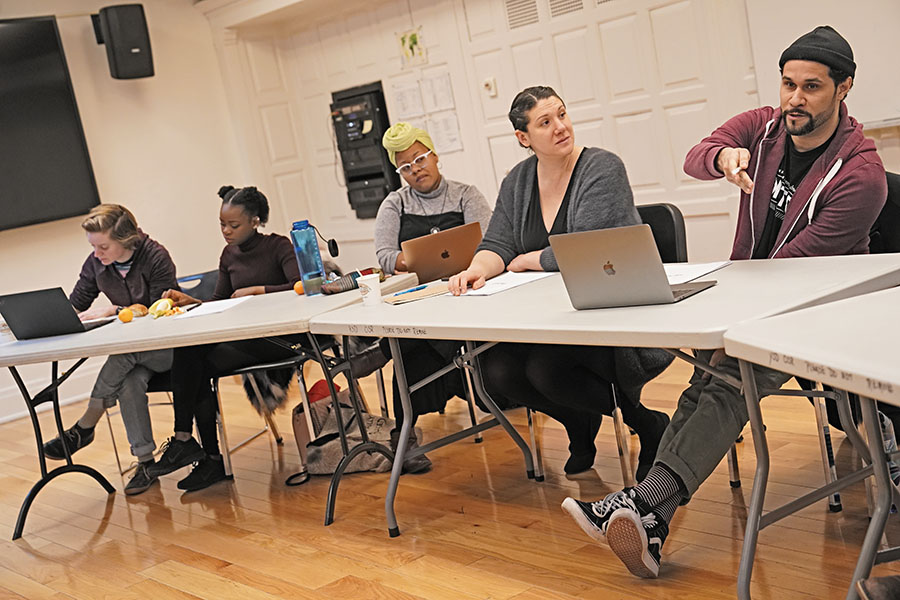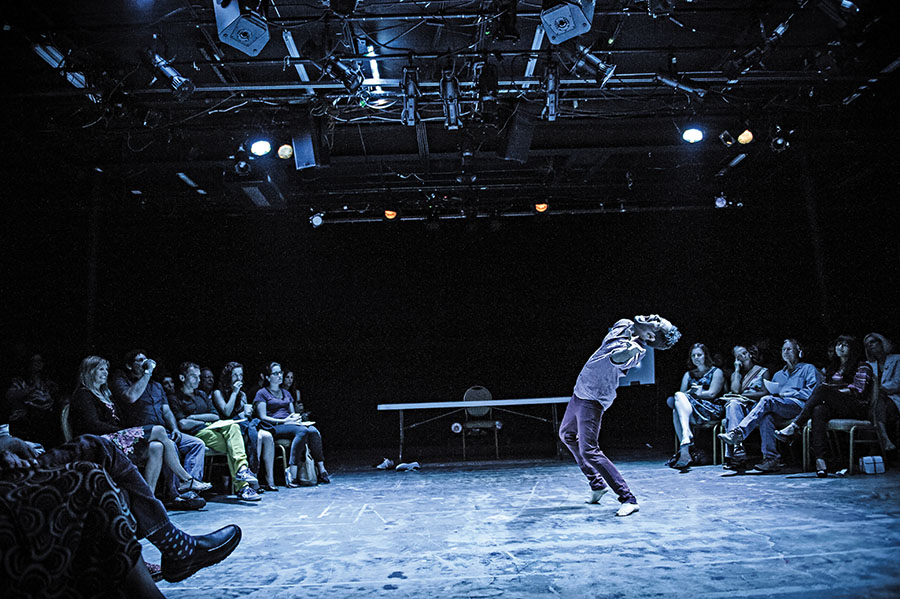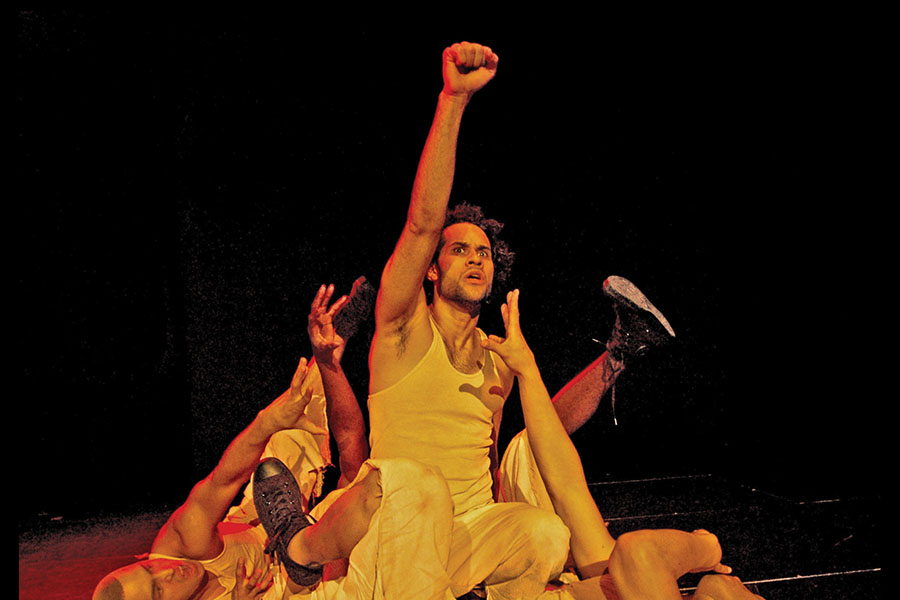This story is part of a larger special issue on playwriting training.
Everything that Rudi Goblen has done as an artist seems somewhere between unlikely and impossible. Growing up as a kid from Nicaragua in a working-class Miami neighborhood, he and some buddies taught themselves to break dance, becoming a world-traveling champion b-boy crew. He then fell in love with dance theatre and performance, becoming an integral part of Miami’s close-knit experimental scene. And though he’s a high school dropout who had never taken a formal writing or theatre class, he was soon writing one-person shows treating such dense themes as mortality and intimacy.
None of these passages seems as unlikely, though, as the one that has brought Goblen, 38, to the MFA program in playwriting at the Yale School of Drama, the storied theatre program at an Ivy League institution with an image as a quintessential bastion of upper-class tradition, power, and privilege.
Certainly he has had his pinch-me moments, thinking: Wow, I’m at Yale.
“Well, didn’t you, when you got here last night?” Goblen asks me, laughing, as we sit in a campus coffee shop where he often writes, surrounded by 20-somethings staring intently at their laptops. “You think, Wouldn’t it be awesome to be an astronaut? And then, shit, I’m on the moon.”
But he went immediately from amazement to exhilaration at the prospect of expanding his art and his creative circle, and of channeling his unique, multilayered history into a new theatrical world.
“I wasn’t intimidated,” Goblen said. “It’s just another process that I have to dedicate myself to. I feel thankful and blessed to be here.” All his classmates, he said, are “beautiful voices. If they’re what theatre is now and what theatre is going to be, I’m super excited for the future.”
Goblen, it turns out, is anything but an outlier. In fact he is just the kind of artist that leaders of the Yale playwriting program, and its drama school, see as the future. As the American theatre wrestles with the complex challenge of expanding the profile of who shapes the art form, the playwrights’ program at one of its most influential institutions has gone all in on new voices from outside established cultural centers and traditions. Rudi Goblen at Yale is the new rule, not the exception.
“The story about Rudi is that he is exactly the student we want here,” said Tarell Alvin McCraney, the Miami-raised playwright leading the changes in the playwriting program since becoming chair in 2017. Sitting in his small office at Yale, wearing a maroon Morehouse College sweatshirt, McCraney looks more like a student himself than the Oscar winner and MacArthur “genius” grant recipient who gave the world Moonlight, Choir Boy, and “David Makes Man,” placing the stories of gay Black men and boys at the center of the cultural conversation.
The buzzy success of 2019 graduate Jeremy O. Harris, who had two plays Off-Broadway while still in the program (Slave Play and “Daddy”), has drawn attention to its cultivation of writers challenging ideas of race. But that’s only one way McCraney has expanded the program’s goals. Certainly he has encouraged racial diversity—this academic year, just one of the nine students in the three-year MFA playwriting program, the first full cohort admitted under his tenure, is white. But equally important, he has brought in students from beyond the major cultural centers, from places like Iowa, Guatemala, Pittsburgh, and Tanzania. McCraney wants to foster dramatists who can tell stories of communities outside the mainstream, in much the same way he’s been inspired by his childhood in Miami’s historic Black neighborhood of Liberty City.
“We hope to identify artists with unique and very intimate storytelling abilities,” McCraney said. “We also want to work with artists who have a great sense of community and spirit of collaboration. My aim is to make sure that students who come from many different places to this very august program recognize they are cornerstones to their community—that there are communities they are from that need their voice. And only they can tell those stories.”
It’s a departure, McCraney said, from his experience at Yale. As the only Black student who graduated from the playwriting program in 2007, he said, “I was given a lot of great insight, great tools, great chances to talk. But very few folks pointed me back toward Miami and Liberty City. I felt that was a missing part of our education here, and that I could provide that. I know what it means to be a voice in your community.”
Anne Erbe, associate chair of the playwriting program, credited McCraney with abandoning what she called “a habit of having one Black playwright per cohort.” In McCraney’s second year, two Black women were admitted. But she said he’s also looking beyond race to focus on a diversity of voices. “Tarell said, ‘I’m looking at the work—how new it is, its connection to community, who they’re writing for,’” Erbe said. “In a very broad way, the focus is not folks writing to succeed on the regular regional or New York theatre circuit.”
These changes are part of a school-wide effort that James Bundy, dean of the drama school since 2002, began five years ago. He points to the school’s history educating significant African American, female, and LGBTQ theatre artists, and to the legacy of former dean Lloyd Richards, who helped launch the careers of Lorraine Hansberry and August Wilson. Bundy decided that the school needed to do more to address the complicated questions of privilege, inclusion, and identity roiling not just the theatre but the wider world as well.
“If we want to walk our talk, we have a lot of work to do,” Bundy said in an interview in his office. “We want to be a part of making our art form more inclusive, more representative. And in better service to the nation and the world.”
Bundy instituted a sometimes-thorny series of internal conversations on everything from curriculum and casting to financial aid and rehearsal practice. The school has added non-white and non-Western artists to reading lists, as well as classes like Race and the American Musical, LatinX Theatre, James Baldwin On Stage, Theatre and Social Change, and Topics in Casting. Bundy has expanded financial aid from $1.4 million to more than $7 million, and playwriting students get a crucial living stipend. Most recently, the school’s departments of stage management, technical design and production, and theatre management eliminated the GRE requirement for admission.
“We began to explicitly address these issues in our curriculum and interrogate our practices,” Bundy said. “For centuries the majority of the most interesting work in the theatre has come not from the mainstream of the culture but the parts of society that have been marginalized. Because those ideas are powerful. We want a community of people who see themselves as agents of change as opposed to upholders of the status quo.”

Goblen’s mother brought him and his older brother to the U.S. from Nicaragua when he was 3, and they lived in Los Angeles and Tampa, Fla., before moving to Sweetwater in Miami, home to the highest concentration of Nicaraguans in the U.S., when he was around 10. His mother raised her sons alone, and money was tight. In his early teens, Goblen and several friends taught themselves to break dance from pre-internet-era videotapes, adopting the name Flipside Kings and becoming successful travelers on a global underground circuit of competitions and conventions—so successful, in fact, that Goblen dropped out of high school.
Hip-hop is still at the heart of who he is and how he moves in the world. “Yo, that scene is dope,” he said at one point in a class discussion. His writing inspirations aren’t traditional playwrights but the likes of OutKast’s André 3000 and spoken-word artist and activist Saul Williams. His b-boy name remains his professional name: Rudi is short for Rudolfo, and Goblen, a playful spelling of “goblin,” riffs on parlance for a dominating dancer—à la “beast,” “monster”—while evoking his idiosyncratic, impishly aggressive breaking style. His confidence is rooted in his self-taught physical virtuosity, and a history of facing off competitors surrounded by screaming crowds of critical fellow dancers, powered by the music and energy of the moment.
“When I battle someone, it lets me know where I stand,” he said. “I know what I need to learn. I have the same sense here: ‘Oh, let me read all of August Wilson’s plays.’”
There’s more than reading to catch up on at Yale. First-year students take a master playwriting class with Fairview author Jackie Sibblies Drury; conceptual courses like Founding Visions, a history of idealism in U.S. theatre; a workshop in collaboration and composition; and the Playwrights’ Studio, a loosely structured salon with faculty and guests. There’s a survey of world theatre history and a course in industry and career strategies. Goblen will write a draft of a new play for Drury’s class, and another for a New Play Lab in the spring, which will get an in-house production. Then there’s the rich buffet of resources at Yale, the temptation of theatre in New York, and the excitement of living outside Miami for the first time as an adult.
It’s a whirlwind of ideas and stimulation. But Goblen is ready. “Why did I come here? To explore, learn, expand, and stretch my craft. I fall in love, and then I need to know everything about whatever I fell in love with.”
Goblen first fell for theatre when he was 23. He had accompanied a friend to an audition for D-Projects, a hybrid devised theatre troupe headed by Teo Castellanos, an influential Miami writer, director, and teacher. Goblen ended up joining the show, called Scratch & Burn, starting a yearslong artistic odyssey. Castellanos didn’t just rehearse and create with his b-boy performers; he also taught them Chekhov and Ntozake Shange, Zulu rituals and Japanese Butoh. (One of his first reading assignments was a text by British director Peter Brook, whom Goblen recently had the chance to meet, along with his fellow first-year students, via McCraney. “He’s like the Yoda, the Dalai Lama of theatre,” said an awed Goblen.)
Goblen was inspired to study on his own, hurling himself into this new turf. Recalls Castellanos of Goblen, “He asked more questions than anybody else. That takes self-determination and a passion for knowledge and skill. You see that in b-boy culture: They’re always trying to be the best. Rudi took that same passion and put it toward the theatre.”
Castellanos is an important connecting figure here. McCraney, 39, also got into theatre through D-Projects as a bullied 14-year-old, and first met Goblen there in 2003-04, a pivotal period during which McCraney’s mother died and he took a year off between DePaul University and Yale. The three men bonded over theatre and their similar backgrounds: Castellanos, from Puerto Rico, grew up in a working-class Black and Latinx Miami neighborhood, and worked blue-collar jobs before starting in theatre. They still seek each other’s advice and gather at New Year’s and Thanksgiving.
“These are my children—I love them,” said Castellanos, 57. “I’ve mentored other young people and artists. But with none of them have I kept such a deep, meaningful working relationship as I have with Tarell and Rudi.”
The values Castellanos taught his former disciples still inspire them, chiefly the idea of theatre as a community bond and a voice for people struggling with poverty, bigotry, and exclusion from social power. He also instilled in them a sense of responsibility to use their knowledge and achievement to give back to communities like the ones they come from.
“Now that I’m older I want to focus more on creating opportunities like Teo created for us,” Goblen said.
Goblen followed his new passion to work with multiple Miami dance theatre and performance artists, in collaborative months- or years-long relationships. (He also kept up his break dance career in music videos, commercials, and awards shows, and performed as a musician and MC.) Beth Boone, artistic and executive director at Miami Light Project, suggested he try writing, then presented him in two short solo pieces, Insanity Isn’t and Fair Welling. In 2013, MLP produced Goblen’s evening-length PET, an interactive, darkly humorous meditation on intimacy, whose startlingly original language blended idiosyncratic Miami-isms with surreal poetry.
After PET, Goblen found himself increasingly drawn to writing and theatre. He published a book of poems and acted in premieres of new plays at Miami New Drama. He was becoming restless—ready for the next stage. When McCraney asked if he’d thought of graduate school, it triggered his creative ambition. Once he discovered that not having a high school degree wasn’t a deal breaker, he applied to Yale in 2018 with PET and made it to the waiting list. The school had never taken someone applying with solo work, so to move up the line Goblen wrote his first multi-character play, Little Boy/Little Man, about two Nicaraguan-born brothers with a conflicted relationship with each other and American life.
“The progression is so clear that it almost seems unreal,” said Michael Yawney, another of Goblen’s close mentor/friends. Yawney, a Florida International University theatre professor who directed PET and staged a reading of Little Boy, attributes Goblen’s progress to a combination of disciplined analysis and improvised invention. “He’s rigorous but not in a cookie-cutter mold. He’s rewriting the rulebook and his own rulebook, really trying to create something new. It’s totally instinctive. He didn’t do this from any plan. I think that’s what makes him exciting to Yale. Yale has a tradition of choosing artists who are unique and idiosyncratic. Their originality comes from deep engagement with the question of what a theatre experience is.”
Indeed, collaboration and ease with different forms are qualities that McCraney and professors like playwright Sarah Ruhl are trying to instill at the school. At an October session of Ruhl’s Reading With Actors, four accomplished New York performers read third-year student Noah Diaz’s in-process play You Will Get Sick, in which a man is stricken by a mysterious illness; the play is threaded with a kind of matter-of-fact surrealism. Everyone joined a discussion carefully structured to bring out neutral feedback and questions, not criticism. Talk ranged through metaphor and language, whether the play’s Wizard of Oz imagery worked, and potential issues with portraying illness as disability.
In her six years on the playwriting faculty, Ruhl said her students have shown all kinds of styles and interests. “One thing I’ve noticed about Yale writers is they’re not usually deeply naturalistic,” said Ruhl after class. “It’s been a while since I’ve seen someone doing kitchen-sink naturalism or something where you think, this could just as easily be a sitcom or a film. So Rudi coming from dance and poetry is actually not as unusual as you might think. There’s a lot of heightened language and openness to experimenting with forms.”
To select each class of writers, McCraney reads the approximately 200 applications and makes an initial cut. Then half a dozen faculty members read the remainder to select 12 finalists, who are interviewed for hours to choose the three who are finally accepted.
“People have a lot of preconceived notions about what Yale is, what an Ivy League school is,” said Jennifer Kiger, associate artistic director of Yale Repertory Theatre, who read Goblen’s first-year application. “So they self-select and say, ‘That’s not me, I couldn’t possibly be welcome here.’ That is not the case. We’re very, very interested in the voices and point of view of people who may be telling stories you haven’t seen on the stage before, or in ways they haven’t been told before.”
Enter Goblen, who shortly after arriving in New Haven shared a photo of himself on social media in front of 305 Crown St., where he’d been interviewed for his MFA spot. He had his own reading of that fortuitous address: “305 for Miami, and Crown for Flipside Kings. If that’s not the universe showing up and saying, ‘You’re good, g., I got you,’ Well then, shit, I don’t know what God is. Feeling blessed, grateful, primed, and psyched for these next three years at Yale.”
Despite this social media sharing, the Yale faculty I spoke to knew little about Goblen’s background, and he seems to want to keep a low profile and just do his work there. No one knew, for instance, that he spent last spring shooting a role in the film version of In the Heights. As I prepared to visit Yale, Goblen wrote to ask that the story focus on all the people and groups who’ve helped him over the years.
“We live in a culture that praises individuals as opposed to communities,” he wrote. “My success is shared by all of us, and vice versa, in the sense that we rejoice in it and are genuinely happy for each other. There is no me without them; no them without us.”
He admits he wants to blow out the jam, i.e. to electrify his Yale compatriots and, he hopes, the mainstream theatre world the way he once ignited a b-boy circle. But he wants to do it by learning everything he can from this new world, then expanding it with everything he’s done; by telling stories that haven’t been heard and opening doors for the next immigrant kid bursting to see what they can do.
“I thought I was writing plays all along,” he said. “Now I am because I’m here. The only way anything can be is because of community. Ultimately we go to the theatre to be part of something. Where else do people do that?”
Former Miami Herald arts and entertainment reporter Jordan Levin has also contributed to publications including The New York Times, The Wall Street Journal, the Los Angeles Times, Latina magazine, and Billboard.







